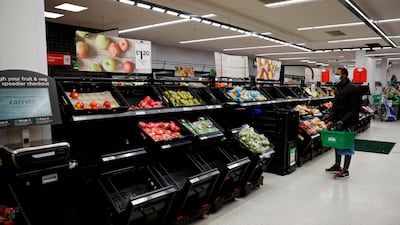The companies behind the first Covid-19 vaccine are confident that the drug will defeat the highly contagious mutant strain from England.
Ugur Sahin, the founder of BioNTech, which created the vaccination alongside pharmaceutical firm Pfizer, said they would know within two weeks if the drug would immunise against the new strain that has sparked a surge of infections.
Mr Sahin also disclosed how his work ethic of 4.30am starts gave him and his wife Ozlem Tureci the drive to work flat-out to find a way to defeat the virus.
The new variant, detected mainly in London and the south-east of England, has sparked worldwide concern because it is estimated to be 70 per cent more transmissible than the original strain.
“We don’t know at the moment if our vaccine is also able to provide protection against this new variant,” Mr Sahin said a day after his company’s drug was approved for use in European Union countries. “But scientifically, it is highly likely that the immune response by this vaccine also can deal with the new virus variants.”
If it doesn’t, he said he hopes his team can adapt the vaccine’s profile within six weeks to suppress the new strain. “We believe there is no reason to be concerned or worried,” he said.
Meanwhile, about 1,700 lorries are stranded in Kent on the southern English coast, prevented from crossing the Channel after France closed its border. In addition, 40 countries have banned flights from Britain, attempting to prevent the new strain from spreading.
Britain has pre-ordered 40 million doses of the Pfizer/BioNTech vaccine and has taken delivery of 800,000 so far, with 500,000 shots administered to mostly elderly people. It is hoped that the mass immunisation programme will bring down the spiralling number of infections that have paralysed the country, with two million cases recorded.
Operating round-the-clock on what they call Project Lightspeed, Mr Sahin and his colleagues realised they had no time to lose at the beginning of this year. “We knew from the beginning that, because we had built up technology and special skills over 20 years of research here, we could be among the first in the world to be able to provide an active vaccine,” he said. Operating in shifts through the night, teams would take over work that wasn’t finished to ensure the research and development continued.
Mr Sahin, born in Turkey, said he’d inherited his strong work ethic from his parents who rose before dawn every day to get to their jobs early “because they had the dream that their children could become something better and study”.
Fortunately for the rest of the world his parents, who emigrated from Turkey to Germany, knew it was “very important that I go to school”, which he did from the age for four in Cologne.
Asked about opportunities for migrants in Germany, he said it was important to live in a society where people respected each other “and where we create the possibility that everyone can achieve their dreams and goals”.
“I think it is important that we all realise that we are giving people from different countries the chance to make a contribution to society,” he said. “In our company there are employees from over 60 different countries and each make a different contribution.”
The German government has now ordered 300 million doses of BioNTech/Pfizer’s vaccine with the first being administered on Sunday, December 27. Mr Sahin will ensure that his employees are vaccinated before he gets the shot, to ensure that the production process continues uninterrupted as his company plans to create more than 1.1 billion doses over the next year.
To help with production, other pharmaceutical companies have interrupted their usual work to accelerate research and distribution and Chancellor Angela Merkel’s government is also on hand to assist. “Whenever we need something, we call the federal government and tell them about our needs and get support,” Mr Sahin said.
While the British and German governments have ordered the majority of doses currently available, Mr Sahin told other European nations that need the vaccine in bulk: “There is always a chance to talk to us”.
BioNTech/Pfizer’s vaccine has to date been authorised for use in more than 45 countries.





















